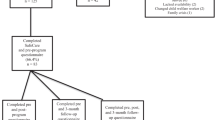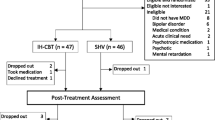Abstract
Caregiver depression impacts parenting behaviors and has deleterious effects on child behavior. Evidence-based interventions to address parenting have not been adapted for use with depressed caregivers in pediatric primary care settings. Our study examined the feasibility and explored outcomes of an evidence-based parenting program implemented in primary care and adapted for caregivers with depressive symptoms caring for toddlers. We conducted a randomized controlled trial with a wait-list control. Participants were caregivers who screened positive for depressive symptoms in pediatric settings with a toddler. Our study was implemented from July 2011 to June 2012. We adapted the Incredible Years Parents, Babies and Toddlers program with the addition of depression psychoeducation (12 weekly sessions), and assessed caregivers at baseline and immediately post-intervention. We assessed participation rates, depressive symptoms, parenting discipline practices, social support, and parenting stress. Our results revealed that 32 caregivers participating in the intervention group had significantly greater improvement in self-reported parenting discipline practices compared to the 29 wait-list control group caregivers. We found no differences between groups in depressive symptoms, social support, or parenting stress. Our study demonstrated that the average attendance was poor (mean attendance = 3.7 sessions). We adapted an evidence-based parenting intervention for caregivers with depressive symptoms and toddlers in primary care; however, participation was challenging. Alternative intervention strategies are needed to reach and retain low-income caregivers with depression symptoms as they face multiple barriers to participation in groups within center-based services.
Trial Registration Clinical Trials.gov identifier NCT01464619.

Similar content being viewed by others
References
Abidin, R. R. (1995). Parenting Stress Index. Odessa, FL: Psychological Assessment Resources.
Arnold, D. S., O’Leary, S. G., Wolff, L. S., & Acker, M. M. (1993). The Parenting Scale: A measure of dysfunctional parenting in discipline situations. Psychological Assessment, 5, 137–144. doi:10.1037/1040-3590.5.2.137.
Beardslee, W. R., Wright, E. J., Gladstone, T. R., & Forbes, P. (2007). Long-term effects from a randomized trial of two public health preventive interventions for parental depression. Journal of Family Psychology, 21, 703–713. doi:10.1037/0893-3200.21.4.703.
Beck, A. T., Steer, R. A., Ball, R., & Ranieri, W. F. (1996). Comparison of Beck Depression Inventories-IA and -II in psychiatric outpatients. Journal of Personality Assessment, 67, 588–597. doi:10.1207/s15327752jpa6703_13.
Beeber, L. S., Schwartz, T. A., Holditch-Davis, D., Canuso, R., Lewis, V., & Hall, H. W. (2013). Parenting enhancement, interpersonal psychotherapy to reduce depression in low-income mothers of infants and toddlers: A randomized trial. Nursing Research, 62, 82–90. doi:10.1097/NNR.0b013e31828324c2.
Beeber, L. S., Schwartz, T. A., Martinez, M. I., Holditch-Davis, D., Bledsoe, S. E., Canuso, R., & Lewis, V. S. (2014). Depressive symptoms and compromised parenting in low-income mothers of infants and toddlers: Distal and proximal risks. Research in Nursing & Health, 37, 276–291. doi:10.1002/nur.21604.
Bennett, I. M., Coco, A., Coyne, J. C., Mitchell, A. J., Nicholson, J., Johnson, E., … Ratcliffe, S. (2008). Efficiency of a two-item pre-screen to reduce the burden of depression screening in pregnancy and postpartum: An IMPLICIT network study. The Journal of the American Board of Family Medicine, 21, 317–325. doi:10.3122/jabfm.2008.04.080048.
Boyd, R. C., Diamond, G. S., & Bourjolly, J. N. (2006). Developing a family-based depression prevention program in urban community mental health clinics: A qualitative investigation. Family Process, 45, 187–203. doi:10.1111/j.1545-5300.2006.00090.x.
Chacko, A., Wymbs, B. T., Chimiklis, A., Wymbs, F. A., & Pelham, W. E. (2012). Evaluating a comprehensive strategy to improve engagement to group-based behavioral parent training for high-risk families of children with ADHD. Journal of Abnormal Child Psychology, 40, 1351–1362. doi:10.1007/s10802-012-9666-z.
Chazan-Cohen, R., Ayoub, C., Pan, B. A., Roggman, L., Raikes, H., McKelvey, L., … Hart, A. (2007). It takes time: Impacts of Early Head Start that lead to reductions in maternal depression two years later. Infant Mental Health Journal, 28, 151–170. doi:10.1002/imhj.20127.
Dozois, D. J. A., Dobson, K. S., & Ahnberg, J. L. (1998). A psychometric evaluation of the Beck Depression Inventory-II. Psychological Assessment, 10, 83–89. doi:10.1037/1040-3590.10.2.83.
Flynn, H. A., Davis, M., Marcus, S. M., Cunningham, R., & Blow, F. C. (2004). Rates of maternal depression in pediatric emergency department and relationship to child service utilization. General Hospital Psychiatry, 26, 316–322. doi:10.1016/j.genhosppsych.2004.03.009.
Gjerdingen, D., Crow, S., McGovern, P., Miner, M., & Center, B. (2009). Stepped care treatment of postpartum depression: Impact on treatment, health, and work outcomes. The Journal of the American Board of Family Medicine, 22, 473–482. doi:10.3122/jabfm.2009.05.080192.
Goodman, S. H., & Gotlib, I. H. (1999). Risk for psychopathology in the children of depressed mothers: A developmental model for understanding mechanisms of transmission. Psychological Review, 106, 458–490. doi:10.1037/0033-295X.106.3.458.
Gross, D., Fogg, L., Webster-Stratton, C., Garvey, C., Julion, W., & Grady, J. (2003). Parent training of toddlers in day care in low-income urban communities. Journal of Consulting and Clinical Psychology, 71, 261–278. doi:10.1037/0022-006x.71.3.442.
Grote, N. K., Swartz, H. A., Geibel, S. L., Zuckoff, A., Houck, P. R., & Frank, E. (2009). A randomized controlled trial of culturally relevant, brief interpersonal psychotherapy for perinatal depression. Psychiatric Services, 60, 313–321. doi:10.1176/appi.ps.60.3.313.
Guevara, J. P., Gerdes, M., Rothman, B., Igbokidi, V., Dougherty, S., Localio, R., & Boyd, R. C. (2016). Screening for parental depression in urban primary care practices: A mixed methods study. Journal of Health Care for the Poor and Underserved, 27, 1858–1871. doi: 10.1353/hpu.2016.0167.
Horwitz, S. M., Briggs-Gowan, M. J., Storfer-Isser, A., & Carter, A. S. (2007). Prevalence, correlates, and persistence of maternal depression. Journal of Women’s Health, 16, 678–691. doi:10.1089/jwh.2006.0185.
Hurley, K. D., Huscroft-D’Angelo, J., Trout, A., Griffith, A., & Epstein, M. (2014). Assessing parenting skills and attitudes: A review of the psychometrics of parenting measures. Journal of Child and Family Studies, 23, 812–823. doi:10.1007/s10826-013-9733-2.
Kessler, R. C., Petukhova, M., Sampson, N. A., Zaslavsky, A. M., & Wittchen, H. U. (2012). Twelve-month and lifetime prevalence and lifetime morbid risk of anxiety and mood disorders in the United States. International Journal of Methods in Psychiatric Research, 21(3), 169–184. doi:10.1002/mpr.1359.
Kroenke, K., Spitzer, R. L., & Williams, J. B. W. (2003). The Patient Health Questionnaire-2: Validity of a two-item depression screener. Medical Care, 41, 1284–1292. doi:10.1097/01.mlr.0000093487.78664.3c.
Le, H. N., Perry, D. F., & Stuart, E. A. (2011). Randomized controlled trial of a preventive intervention for perinatal depression in high-risk Latinas. Journal of Consulting and Clinical Psychology, 79, 135–141. doi:10.1037/a0022492.
Lovejoy, M. C., Graczyk, P. A., O’Hare, E., & Neuman, G. (2000). Maternal depression and parenting behavior: A meta-analytic review. Clinical Psychology Review, 20, 561–592. doi:10.1016/s0272-7358(98)00100-7.
McKee, M. D., Zayas, L. H., Fletcher, J., Boyd, R. C., & Nam, S. H. (2006). Results of an intervention to reduce perinatal depression among low-income minority women in community primary care. Journal of Social Service Research, 32(4), 63–81. doi:10.1300/J079v32n04_04.
McPhee, L. (Director and Producer). (2008). Depression: Out of the shadows [Documentary]. Available from http://www.pbs.org/wgbh/takeonestep/depression/
Minkovitz, C. S., Strobino, D., Scharfstein, D., Hou, W., Miller, T., Mistry, K. B., & Swartz, K. (2005). Maternal depressive symptoms and children’s receipt of health care in the first 3 years of life. Pediatrics, 115, 306–314. doi:10.1542/peds.2004-0341.
Nylen, K. J., Moran, T. E., Franklin, C. L., & O’Hara, M. W. (2006). Maternal depression: A review of relevant treatment approaches for mothers and infants. Infant Mental Health Journal, 27, 327–343. doi:10.1002/imhj.20095.
O’Mahen, H. A., & Flynn, H. A. (2008). Preferences and perceived barriers to treatment for depression during the perinatal period. Journal of Women’s Health, 17, 1301–1309. doi:10.1089/jwh.2007.0631.
Perrin, E. C., Sheldrick, R. C., McMenamy, J., Henson, B. S., & Carter, A. S. (2014). Improving parenting skills for families of young children in pediatric settings: A randomized clinical trial. The Journal of the American Medical Association Pediatrics, 168, 16–24. doi:10.1001/jamapediatrics.2013.2919.
Reid, M. J., Webster-Stratton, C., & Hammond, M. (2003). Follow-up of children who received the Incredible Years intervention for oppositional-defiant disorder: Maintenance and prediction of 2-year outcome. Behavior Therapy, 34, 471–491. doi:10.1016/S0005-7894(03)80031-X.
Reitman, D., Currier, R. O., & Stickle, T. R. (2002). A critical evaluation of the Parenting Stress Index-Short Form (PSI-SF) in a Head Start population. Journal of Clinical Child and Adolescent Psychology, 31, 384–392. doi:10.1207/153744202760082649.
Riley, A. W., Valdez, C. R., Barrueco, S., Mills, C., Beardslee, W., Sandler, I., & Rawal, P. (2008). Development of a family-based program to reduce risk and promote resilience among families affected by maternal depression: Theoretical basis and program description. Clinical Child and Family Psychology Review, 11(1–2), 12–29. doi:10.1007/s10567-008-0030-3.
Shaw, D. S., Connell, A., Dishion, T. J., Wilson, M. N., & Gardner, F. (2009). Improvements in maternal depression as a mediator of intervention effects on early childhood problem behavior. Development and Psychopathology, 21, 417–439. doi:10.1017/S0954579409000236.
Tandon, S. D., Cluxton-Keller, F., Leis, J., Le, H. N., & Perry, D. F. (2012). A comparison of three screening tools to identify perinatal depression among low-income African American women. Journal of Affective Disorders, 136, 155–162. doi:10.1016/j.jad.2011.07.014.
Toth, S. L., Rogosch, F. A., Manly, J. T., & Cicchetti, D. (2006). The efficacy of toddler-parent psychotherapy to reorganize attachment in the young offspring of mothers with major depressive disorder: A randomized preventive trial. Journal of Consulting and Clinical Psychology, 74, 1006–1016. doi:10.1037/0022-006x.74.6.1006.
Turner, K. M., & Sanders, M. R. (2006). Help when it’s needed first: A controlled evaluation of brief, preventive behavioral family intervention in a primary care setting. Behavior Therapy, 37, 131–142. doi:10.1016/j.avb.2005.07.005.
Webster-Stratton, C. (2005). The Incredible Years: A training series for the prevention and treatment of conduct problems in young children. In E. D. Hibbs & P. S. Jensen (Eds.), Psychosocial treatments for child and adolescent disorders: Empirically based strategies for clinical practice (2nd ed., pp. 507–555). Washington, DC: American Psychological Association.
Webster-Stratton, C. (2008). The Incredible Years Parents, Babies and Toddlers series: Leader guide for parent of babies and toddlers age 0–3 years. Seattle, WA: Incredible Years Press.
Webster-Stratton, C., & Hammond, M. (1997). Treating children with early-onset conduct problems: A comparison of child and parent training interventions. Journal of Consulting and Clinical Psychology, 65, 93–109. doi:10.1016/S0005-7894(05)80334-X.
Yonkers, K. A., Smith, M. V., Lin, H., Howell, H. B., Shao, L., & Rosenheck, R. A. (2009). Depression screening of perinatal women: An evaluation of the Healthy Start depression initiative. Psychiatric Services, 60, 322–328. doi:10.1176/appi.ps.60.3.322.
Zimet, G. D., Dahlem, N. W., Zimet, S. G., & Farley, G. K. (1988). The Multidimensional Scale of Perceived Social Support. Journal of Personality Assessment, 52, 30–41.
Acknowledgements
This study was funded by Grant R40MC11627 from the Maternal and Child Health Bureau and a CATCH grant from the American Academy of Pediatrics. We wish to thank the staff and clinicians at all the participating practices affiliated with The Children’s Hospital of Philadelphia and the Philadelphia Department of Public Health and our advisory board (Susan Robbins, Gayle Edelsohn, Roxy Wiloszyn, Donna Bibbs, Suzanne O’Connor, and Katja Pigur). We would also like to thank Shadiya Moss for her research assistance on this manuscript.
Funding
This study was funded by the Maternal and Child Health Bureau (R40MC11627) and the American Academy of Pediatrics.
Author information
Authors and Affiliations
Corresponding author
Ethics declarations
Conflict of Interest
The authors declare that they have no conflict of interest.
Ethical Approval
All procedures performed in studies involving human participants were in accordance with the ethical standards of the institutional and national research committee and with the 1964 Helsinki declaration and its later amendments or comparable ethical standards.
Informed Consent
Informed consent was obtained from all individual participants included in the study.
Rights and permissions
About this article
Cite this article
Boyd, R.C., Gerdes, M., Rothman, B. et al. A Toddler Parenting Intervention in Primary Care for Caregivers With Depression Symptoms. J Primary Prevent 38, 465–480 (2017). https://doi.org/10.1007/s10935-017-0481-8
Published:
Issue Date:
DOI: https://doi.org/10.1007/s10935-017-0481-8




